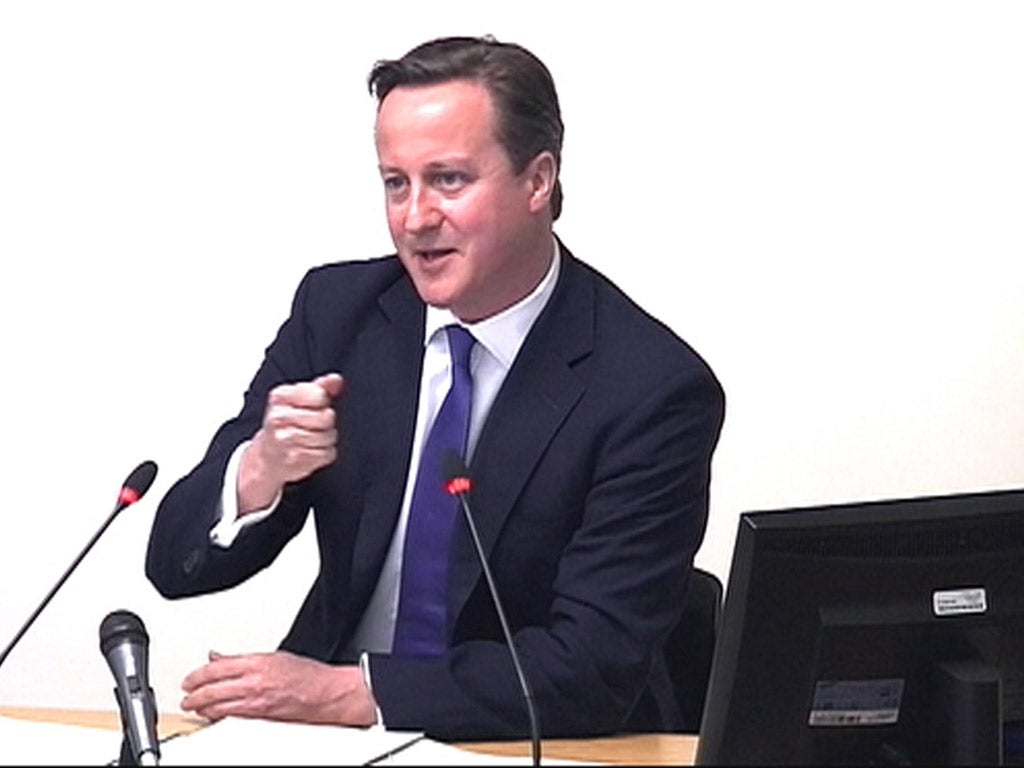Andrew Grice: Cameron, the forgetful sheriff, dodges silver bullets
He looked uncomfortable at the questions about his relationship with senior Murdoch empire figures


Your support helps us to tell the story
From reproductive rights to climate change to Big Tech, The Independent is on the ground when the story is developing. Whether it's investigating the financials of Elon Musk's pro-Trump PAC or producing our latest documentary, 'The A Word', which shines a light on the American women fighting for reproductive rights, we know how important it is to parse out the facts from the messaging.
At such a critical moment in US history, we need reporters on the ground. Your donation allows us to keep sending journalists to speak to both sides of the story.
The Independent is trusted by Americans across the entire political spectrum. And unlike many other quality news outlets, we choose not to lock Americans out of our reporting and analysis with paywalls. We believe quality journalism should be available to everyone, paid for by those who can afford it.
Your support makes all the difference.David Cameron admitted yesterday that his appointment of Andy Coulson as communications director had "come back to haunt" him. What he can't admit – in public – is that his decision almost a year ago to set up the Leveson Inquiry has done the same.
The Prime Minister, under intense pressure from Ed Miliband after the revelation that the murdered teenager Milly Dowler's phone was hacked, thought he was setting up a judicial inquiry into press standards and regulation. His problem is that it has often appeared as if it is an inquiry into his decisions and his judgement.
Last night, close allies of Mr Cameron professed themselves happy with his performance yesterday and the absence of any "silver bullet" revelations. They believe the controversy over handing Jeremy Hunt the decision on News Corp's bid for BSkyB has been ended by the disclosure that government lawyers backed it.
Yet Mr Cameron looked uncomfortable at the questions about his personal relationships with senior figures in the Murdoch empire, especially when the fawning "Yes we Cam!" text by Rebekah Brooks, the former chief executive of News International, was read out in Court 73 at the Royal Courts of Justice. At that moment, he – not the press – was definitely on trial.
It also undermined the PM's strategy of telling the voters that Labour and Tory politicians were "all in it together" in being too chummy with the Murdoch clan for their own good – and the country's. Whatever the links in the Blair-Brown era, the BSkyB bid happened on Mr Cameron's watch. And it would almost certainly have been allowed without the Milly Dowler revelations.
Everyone agrees there should be a cross-party consensus on a tougher system of press regulation– not least Lord Justice Leveson, who does not want to see his report join previous tomes about the issue on dusty shelves.
However, there is little sign of such a consensus after this week's hearings involving senior politicians. Mr Cameron made clear his preference for independent self-regulation, with effective sanctions for errant newspapers, all of whom would have to accept the new rules (rather than opt out, as Express Newspapers did from the Press Complaints Commission).
There is not even consensus within the Coalition Government. The previous day, Mr Cameron's deputy, Nick Clegg, said "genuine independence" on regulation might need to be "underpinned by statute." Ed Miliband made a similar point when he appeared before the inquiry.
Last night, Downing Street stopped short of making a firm commitment that a new press regulatory system would be in place by the 2015 election.
The first green shoots of the long grass into which the issue of press regulation might be kicked, perhaps?
As Mr Cameron admitted: "What has taken a long time to go wrong, I suspect, will take quite a long time to put right."
Join our commenting forum
Join thought-provoking conversations, follow other Independent readers and see their replies
Comments